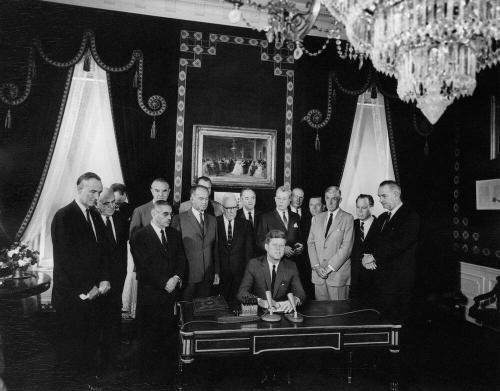The Obama administration came into office determined to chart a new course on Iran, only to find itself quickly confronted with this same old quandary when the ground shifted suddenly and dramatically. The epic upheaval that followed Iran’s June 2009 presidential election did not formally derail the new administration’s diplomacy toward Tehran, but it surely shattered any expectations for quickly and durably ending the estrangement or resolving the increasingly urgent international concerns about Iran’s nuclear ambitions.
In the wake of Iran’s internal unrest, the U.S. policy debate has reverted to the familiar formula of carrot-and-stick, with a distinct emphasis on the latter. Although diplomacy remains the U.S. default position, at least through December 2009, the U.S. discourse has largely presumed its failure and leapfrogged to focus on prospects for new punitive measures to pressure Iran into abandoning the more worrisome elements of its nuclear infrastructure. Even as the first round of nuclear negotiations produced a tentative—and later rescinded—Iranian confidence-building measure on addressing Western concerns about Iran’s nuclear capability, congressional committees busied themselves developing a new round of unilateral measures against Iran, including measures to restrict sales of refined petroleum products.
The new U.S. consensus on Iran favors economic sanctions, preferably “crippling” measures that target Iran’s purported Achilles’ heel, primarily as a means of derailing an Iranian nuclear weapons capability, but also with the hope of facilitating a democratic breakthrough.
Unfortunately, the prospect of crippling the Iranian economy is a fallacy, and a dangerous one at that. A survey of the manifold measures already in place and their track record in moderating Iranian behavior speaks to the limitations of economic pressures as a means of altering Iran’s security priorities and policies. Moreover, as even the most ardent advocates will privately acknowledge, the key prerequisites for a successful sanctions-centric approach—protracted duration and broad adherence—are almost certainly unattainable in this case. As a result, despite Iran’s economic liabilities and its deeply divided polity, the recent embrace of sanctions by many in Washington represents a dangerous illusion. Economic pressure may have a role to play in persuading Tehran of the utility of dialogue, but as the primary tool of U.S. policy, punitive measures will not succeed in solving U.S. concerns about the Iranian regime and its behavior. If the Obama administration is going to blunt Iran’s nuclear ambitions without the use of force, negotiations remain the tool of choice.



Commentary
Sanctioning Iran: If Only It Were So Simple
December 15, 2009